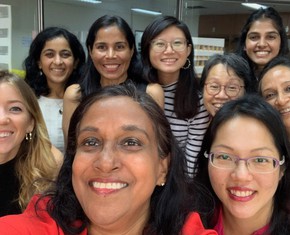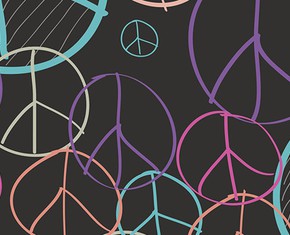The views expressed in our content reflect individual perspectives and do not represent the authoritative views of the Baha'i Faith.
Nature has endowed adolescent boys with the strength, agility, and physical stamina they’ve needed since the age when tribal life depended on the traditionally manly skills of the daily hunt.
Given those physical abilities, how do we raise peaceful sons? Aren’t adolescent boys naturally inclined toward physicality and even violence? Isn’t that why armies all over the world recruit them? Doesn’t the rising testosterone in teenage boys make them that way?
Many societies around the world are asking those questions now.
RELATED: I’m a Guy – You Mean I Should Have Actual Feelings?
Lots of idealist parents look on with dismay when their sweet small boy, raised peacefully and without gender bias, flies off the furniture dressed as an action hero or plays in the yard using sticks as imaginary weapons. Child-rearing experts understand that raising kind, peaceful boys doesn’t mean denying the power of their natural instincts – but instead helps young men harness and control those feelings and use them wisely, and in the process discover more about the spiritual aspects of the male character.
Of course, every child models parental behavior. For that reason, and many more, the Baha’i teachings ask parents to never use physical force or violence with their children:
… when the bough is green and tender it will grow in whatever way ye train it. Therefore is it incumbent upon the mothers to rear their little ones even as a gardener tendeth his young plants. Let them strive by day and by night to establish within their children faith and certitude, the fear of God, the love of the Beloved of the worlds, and all good qualities and traits. Whensoever a mother seeth that her child hath done well, let her praise and applaud him and cheer his heart; and if the slightest undesirable trait should manifest itself, let her counsel the child and punish him, and use means based on reason, even a slight verbal chastisement should this be necessary. It is not, however, permissible to strike a child, or vilify him, for the child’s character will be totally perverted if he be subjected to blows or verbal abuse.
When parents hurt children, the children tend to learn that violence is an acceptable tool. Many studies have shown that physically abusive men who perpetrate domestic violence were also physically abused as children. Child-rearing expert Dr. William Pollack has written:
Many people base their thinking about boys on the myth that “testosterone = aggressiveness = boys,” but nothing in the research, mine included, proves that equation to be true … So why do men behave so much more violently than women do, if there is not male “violence chromosome?” When boys feel disconnected from adequate love and support and afraid of being shamed, when they harden themselves and then put on the macho mask, the one emotion they feel it’s acceptable to show, and thus the only emotion they will show, is anger.
Boys put on that “macho mask” when they learn to suppress and stifle their emotions. For some small boys, the first step of this process might involve substituting violence with his natural instinct for gentle rescue – so instead of pretending to kill an enemy, he might rescue and care for a small animal or save an endangered species in his imagination.
In tiffs at home, boys and girls often respond differently. Some boys can lash out immediately, without thinking. Patiently teaching boys a process for conflict resolution that encourages empathy and thinking through his potential reactions actually empowers them by giving them options. During this process the parents can point out to him that spiritual maturity means choosing the peaceful path.
Parents who expose their sons to diverse types of people, and who model appreciation of the differences in their perspectives, cultures and plights in life, will notice benefits to their boys. Modeling empathy sets the tone for generating a range of emotional skill sets the boys will need as adults.
As a boy matures, and life presents problems that trigger aggression, the dinner table or a walk in the neighborhood can become a time for hypothetical problem-solving sessions with an array of purpose-centered, peaceful solutions. The boy might complain about wanting to defend his friend who is victimized by bullies, for example. The parent can then help the child weave thoughtful steps that build empathy and create peaceful solutions. The boy not only develops higher principles, but a broader range of options for responding, in the moment, to anger, emotional upset or conflict. As a part of that process, the parent can also teach him to use meta-cognition to recognize when he feels the immediate need to react with violence or verbal assault – and to have a range of two or three alternative responses ready.
Meditative practices, so helpful to adults, have profound results for children and adolescents who learn to control their impulsivity, wait out their adrenaline rush in moments of anger, and think through a situation before acting on it. Rather than simply counting to ten before choosing an action, the children who have learned to apply guided imagery on a regular basis increase their focus and alter their behavior.
Children introduced to prayer at an early age also have many more internal tools to deal with anger and strife. The meditative aspects of prayer offer a calming focal point beyond self, and the person saying the prayer can actually ask for guidance. Can you imagine the positive impact of the boys around the world who learn to effectively use prayer and meditation as a means to increase their love for others?
RELATED: Boys – and Men – Need an Actual Role Model
A young man influenced by all these processes may learn to see his world in a new light as he comes of age. Parents can continue to open up opportunities for this boy to address injustice and suffering using nonviolent methods, introducing him to those who have discovered a variety of ways to work for peace as a means of enhancing well-being in the world.
A boy who begins his day witnessing the sincere prayers of a parent – especially a father – will feel the impact of his own meditations, receive opportunities to experience hardship and to empathize with others, and have the great advantage of becoming a true peacemaker.
When given a chance to show compassion over aggression, his daily prayer and meditation will reinforce the practical opportunities offered by the parent. In that moment, all these advantages can unite to help the boy regard his own male instincts as normal — and to transcend the ones that impel him toward an angry or violent reaction. As a peacemaker, he learns to seize the opportunity to polish the spiritual qualities that help him expand his capacity for a deep love of humanity.
Ultimately, this path to manhood, much more challenging than merely developing brute strength and using it to lash out, will undoubtedly reinforce his definition of what maturity means and become his default instinct. His capacity for love can then shape him into a mature adult peacemaker, just as Abdu’l-Baha recommended:
Love is greater than peace, for peace is founded upon love. Love is the objective point of peace, and peace is an outcome of love. Until love is attained, peace cannot be … The love which is from God is the fundamental. This love is the object of all human attainment, the radiance of heaven, the light of man.
















Comments
Sign in or create an account
Continue with Googleor